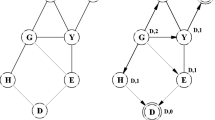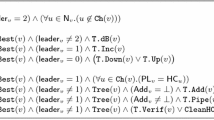Abstract
This paper considers the self-stabilizing leader-election problem in a model of interacting anonymous finite-state agents. Leader election is a fundamental problem in distributed systems; many distributed problems are easily solved with the help of a central coordinator. Self-stabilizing algorithms do not require initialization in order to operate correctly and can recover from transient faults that obliterate all state information in the system. Anonymous finite-state agents model systems of identical simple computational nodes such as sensor networks and biological computers. Self-stabilizing leader election is easily shown to be impossible in such systems without additional structure.
An eventual leader detector Ω? is an oracle that eventually detects the presence or absence of a leader. With the help of Ω?, uniform self-stabilizing leader election algorithms are presented for two natural classes of network graphs: complete graphs and rings. The first algorithm works under either a local or global fairness condition, whereas the second requires global fairness. With only local fairness, uniform self-stabilizing leader election in rings is impossible, even with the help of Ω?.
Preview
Unable to display preview. Download preview PDF.
Similar content being viewed by others
References
Chandra, T.D., Hadzilacos, V., Toueg, S.: The weakest failure detector for solving consensus. Journal of the ACM 20(4), 685–722 (1996)
Angluin, D., Aspnes, J., Diamadi, Z., Fischer, M.J., Peralta, R.: Computation in networks of passively mobile finite-state sensors. In: Twenty-Third ACM Symposium on Principles of Distributed Computing, pp. 290–299 (2004)
Angluin, D., Aspnes, J., Chan, M., Fischer, M.J., Jiang, H., Peralta, R.: Stably computable properties of network graphs. In: Prasanna, V.K., Iyengar, S.S., Spirakis, P.G., Welsh, M. (eds.) DCOSS 2005. LNCS, vol. 3560, pp. 63–74. Springer, Heidelberg (2005)
Angluin, D., Aspnes, J., Fischer, M.J., Jiang, H.: Self-stabilizing population protocols. In: Anderson, J.H., Prencipe, G., Wattenhofer, R. (eds.) OPODIS 2005. LNCS, vol. 3974, pp. 79–90. Springer, Heidelberg (2006)
Dijkstra, E.W.: Self-stabilizing systems in spite of distributed control. Communications of the ACM 17(11), 643–644 (1974)
Schneider, M.: Self-stabilization. ACM Computing Surveys 25(1), 45–67 (1993)
Itkis, G., Lin, C., Simon, J.: Deterministic, constant space, self-stabilizing leader election on uniform rings. In: Helary, J.-M., Raynal, M. (eds.) WDAG 1995. LNCS, vol. 972, pp. 288–302. Springer, Heidelberg (1995)
Higham, L., Myers, S.: Self-stabilizing token circulation on anonymous message passing rings. Technical report, University of Calgary (1999)
Dolev, S., Israeli, A., Moran, S.: Uniform dynamic self-stabilizing leader election. IEEE Transactions on Parallel and Distributed Systems 8, 424–440 (1997)
Beauquier, J., Gradinariu, M., Johnen, C.: Memory space requirements for self-stabilizing leader election protocols. In: Eighteenth ACM Symposium on Principles of Distributed Computing, pp. 199–207 (1999)
Ghosh, S., Gupta, A.: An exercise in fault-containment: Self-stabilizing leader election. Information Processing Letters (59), 281–288 (1996)
Fernández, A., Jiménez, E., Raynal, M.: Eventual leader election with weak assumptions on initial knowledge, communication reliability, and synchrony. In: 2006 International Conference on Dependable Systems and Networks (2006)
Chandra, T.D., Toueg, S.: Unreliable failure detectors for reliable distributed systems. Journal of the ACM 43(2), 225–267 (1996)
Aguilera, M.K., Delporte-Gallet, C., Fauconnier, H., Toueg, S.: Communication-efficient leader election and consensus with limited link synchrony. In: Proceedings of the Twenty-third ACM Symposium on Principles of Distributed Computing, pp. 328–337 (2004)
Author information
Authors and Affiliations
Editor information
Editors and Affiliations
Rights and permissions
Copyright information
© 2006 Springer-Verlag Berlin Heidelberg
About this paper
Cite this paper
Fischer, M., Jiang, H. (2006). Self-stabilizing Leader Election in Networks of Finite-State Anonymous Agents. In: Shvartsman, M.M.A.A. (eds) Principles of Distributed Systems. OPODIS 2006. Lecture Notes in Computer Science, vol 4305. Springer, Berlin, Heidelberg. https://doi.org/10.1007/11945529_28
Download citation
DOI: https://doi.org/10.1007/11945529_28
Publisher Name: Springer, Berlin, Heidelberg
Print ISBN: 978-3-540-49990-9
Online ISBN: 978-3-540-49991-6
eBook Packages: Computer ScienceComputer Science (R0)




